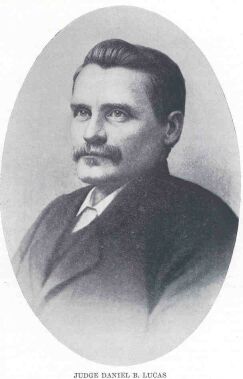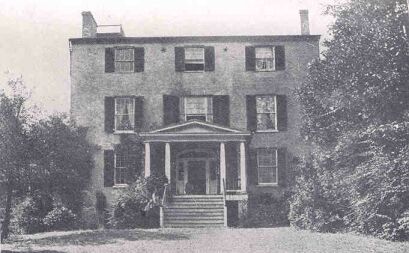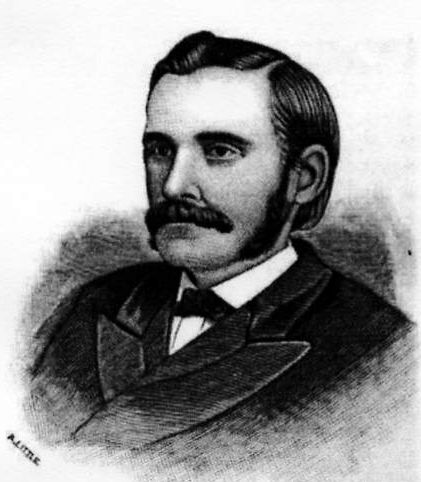Daniel Bedinger Lucas

(1836-1909)
West Virginia
[formerly Virginia]

Geo. W. Atkinson, Bench and Bar of West Virginia
36
(Charleston, West Virginia: Virginian Law Book Co., 1919)
Daniel Bedinger Lucas was born in 1836 at "Rion
Hall" in Charles Town, Virginia (now West Virginia). His parents
were both from distinguished Virginia families. He studied at private
academics and attended the University of Virginia where he graduated
in 1856. He studied law at the school of Judge
John W. Brockenbrough, at Lexington, Virginia (which was annexed
to Washington and Lee
in 1866) and graduated in 1859 but moved the next year to Richmond.
He then returned to Charles Town and took up the practice of law.
Lucas's military service in the Civil War is described
as follows by the archivist at Virginia Tech, where his papers are
held:
At the beginning of the Civil War in 1861 he joined
the staff of General Henry A. Wise and took part in the Kanawha
Valley campaign, but his physical disability from a childhood
spine injury kept him from active service in the last years of
the war. Toward the end of the war he ran the blockade to defend
his friend John Yates Beall, accused of being a Confederate spy,
but was unable to defend him against the charges. Beall was executed
on Governors Island, New York.
Barred from the practice of law until 1871, Lucas
turned to literature and became co-editor of the Baltimore Southern
Metropolis. Many of his poems were published in this magazine.
He reentered the practice of law in 1871 and took a prominent
role in the Democratic party politics of West Virginia, acting
as Democratic elector in the elections of 1872 and 1876, to the
legislature in 1884 and 1886, and as a member of the supreme court
of appeals from 1889 to 1893.
"Judge Lucas attained great distinction in his
profession, because of his wonderful grasp of intricate legal questions
and his eloquent and convincing oratory. Among the honors that came
to him were his election to the State Legislature, and his appointment
as judge of the Supreme Court of Appeals of his State [West Virginia],
of which he was president at the time of his death. On account of
his extensive law practice, he declined to accept a position as
professor of law in West Virginia University, and also an appointment
as circuit judge in his district." [Source:
Ella May Turner, Stories and Verse of West Virginia 133
(Scottdale, Pennsylvania: Mennonite Publishing House, rev. ed. 1925)(1923)]
Lucas's sister, Virginia Bedinger Lucas, also a poet,
was sometimes called the "Pastoral Poet of the Valley."
Lucas was often referred to as the "poet of the Shenandoah Valley."
Lucas is best remembered for the poem, "The Land Where We Were
Dreaming." He died at Rion Hall on June 24, 1909.

Rion Hall
Family Home of Daniel Bedinger Lucas
Warren Wood, Representative Authors
of West Virginia
(Ravenswood,West Virginia: Worth-While Book Company, 1926)

Harper's Weekly
March 12, 1887 — p. 183
|
DANIEL B. LUCAS.
Senator Camden, of West Virginia, who was
the candidate of his party in the Legislature for
re-election, was so vigorously opposed by a part
of the Democratic members that the entire ses
sion was consumed in a fruitless effort to elect
him, or to make a combination by which some
other candidate could be chosen. The opposi
tion was mainly due to his alleged alliance with
the railroad interests of the State and with the
Standard Oil Company. One of his most vigorous and uncompromising opponents in the Legislature was Mr. Daniel Bedinger Lucas, of Charlestown, and immediately after the close of the session Lucas was appointed by Governor Wilson as Camden's successor.
Mr. Lucas was born at Charlestown in 1836,
and was the son of William Lucas, a member of
Congress in the days of Jackson . He was graduated at the University of Virginia, and was
somewhat distinguished as a poet in college.
When the University celebrated its semicentenary in 1875, he was the poet of the occasion. Some years ago he published a volume
of poems entitled The Maid of Northumberland.
After leaving college he studied law, but during
the war he served as private secretary to Governor Wise . After the war he opened a law office
at Charlestown with Thomas C. Green , now one of
the judges of the Court of Appeals of West Virginia. He took an active part in politics, and in
1872 was a candidate for Presidential Elector on
the Greeley ticket. He held the same position
in 1876 and 1884, and voted for Tilden and Hendricks and for Cleveland and Hendricks. For
ten years he has been a prominent opponent of
the Standard Oil Company's influence in West
Virginia politics, and more than once his effort
to be elected to Congress has been defeated by
it. Two years ago he and Senator Kenna met in
the State Convention for the nomination of Governor as rival leaders in the party, and Lucas succeeded in securing the nomination of E. Willis
Wilson, the present Governor. He was elected
to the Legislature in 1884 and again in 1886, and
there continued his fight against the Standard
Oil Company and its representatives, including
Senator Camden , whose re-election he was largely
instrumental in defeating. Mr. Lucas in 1869
married the daughter of Henry L. Brooks, a
prominent lawyer of Richmond. He has continued to take a lively interest in literature and
learning, and is one of the Regents of the University of Virginia.
|
|
|
| |


Geo. W. Atkins & Alvaro F. Gibbens, Prominent Men of West Virginia 576
(Wheeling: W.L. Callin, 1890)
Daniel
Bedinger Lucas
short bio
Daniel B. Lucas
Wilipedia
Daniel B. Lucas
Geo. W. Atkinson, Bench and Bar of West Virginia 36-38
(Charleston, West Virginia: Virginian Law Book Co., 1919)
Daniel Bedinger Lucas
Geo. W. Atkins & Alvaro F. Gibbens, Prominent Men of West Virginia 576-583
(Wheeling: W.L. Callin, 1890)
IN THE LAND WHERE WE WERE DREAMING
Fair were our nation's visions, and as grand
As ever floated out of fancy-land;
Children we were in simple faith,
But god-like children, whom nor
death,
Nor threat of danger drove from honor's path—
In the land where we were dreaming!
Proud were our men as pride of birth could render,
As violets our women pure and tender;
And when they spoke, their voices
thrill
At evening hushed the whip-poor-will,
At morn the mocking bird was mute and still,
In the land where we were dreaming!
And we had graves that covered more of glory,
Than ever taxed the lips of ancient story;
And in our dreams we wove the thread
Of principles for which had bled,
And suffered long our own immortal dead,
In the land where we were dreaming!
Tho' in our land we had both bond and free,
Both were content, and so God let them be;
Till Northern glances, slanting
down,
With envy viewed our harvest sun—
But little recked we, for we still slept on,
In the land where we were dreaming!
Our sleep grew troubled; and our dreams grew wild;
Red meteors flashed across our heaven's field;
Crimson the Moon; between the Twins
Barbed arrows flew in circling lanes
Of light, red Comets tossed their fiery manes
O'er the land where we were dreaming!
Down from her eagle height smiled Liberty,
And waved her hand in sign of victory;
The world approved, and everywhere,
Except where growled the Russian
bear,
The brave, the good and just gave us their prayer,
For the land where we were dreaming!
High o'er our heads a starry flag was seen,
Whose field was blanched, and spotless in its sheen;
Chivalry's cross its union bears,
And by his scars each vet'ran swears
To bear it on in triumph through the wars,
In the land where we were dreaming!
We fondly thought a Government was ours—
We challenged place among the world's great powers;
We talk'd in sleep of rank, commission,
Until so life-like grew the vision,
That he who dared to doubt but met derision,
In the land where we were dreaming!
A figure came among us as we slept—
At first he knelt, then slowly rose and wept;
Then gathering up a thousand spears,
He swept across the field of Mars,
Then bowed farewell and walked behind the stars,
From the land where we were dreaming!
We looked again, another figure still
Gave hope, and nerved each individual will;
Erect he stood, as clothed with
power;
Self-poised, he seemed to rule the
hour,
With firm, majestic sway,—of strength a tower,
In the land where we were dreaming!
As while great Jove, in bronze, a warder god,
Gazed eastward from the Forum where he stood,
Rome felt herself secure and free,—
So Richmond, we, on guard for thee,
Beheld a bronzed hero, god-like Lee,
In the land where we were dreaming!
As wakes the soldier when the alarm calls,—
As wakes the mother when her infant falls,—
As starts the traveler when around
His sleepy couch the fire-bells
sound,—
So woke our nation with a single bound—
In the land where we were dreaming!
Woe! Woe! is us, the startled mothers cried,
While we have slept, our noble sons have died!
Woe! Woe! is us, how strange and
sad,
That all our glorious visions fled,
Have left us nothing real but our dead,
In the land where we were dreaming!And
are they really dead, our martyred slain?
No, Dreamers! Morn shall bid them rise again,
From every plain,—from every height,—
On which they seemed to die for
right,
Their gallant spirits shall renew the fight,
In the land where we were dreaming!
Unconquered still in soul, tho' now o'er-run,
In peace, in war, the battle's just begun!
Once this Thyestean banquet o'er,
Grown strong the few who bide their
hour,
Shall rise and hurl its drunken guests from power,
In the land where we were dreaming!
[Source: Ella May Turner, Stories and Verse
of West Virginia 133 (Scottdale, Pennsylvania: Mennonite Publishing
House, rev. ed. 1925)(1923)]
Poetry
Daniel Bedinger Lucas, The Wreath of Eglantine,
and Other Poems (Baltimore: Kelly, Piet & Company, 1869) [online
text]
[Note: Virginia Bedinger Lucas,
Daniel Bedinger Lucas's sister often published her poetry under
the pen name, Eglantine. The collection of poetry which Lucas published
in 1869 under the title The Wreath of Eglantine, and Other Poems
includes his sister's poetry.]
_________________, The Maid of Northumberland:
A Dramatic Poem (New York: G.P. Putman's Sons, 1879) (a verse
play based on the Civil War) [online
text]
_________________, Ballads and Madrigals (New
York: Pollard & Moss, 1884)
_________________, The Land Where We Were Dreaming
(Boston: Roger G. Badger/Gorham Press, 1913) [online text]
____________________, Dramatic
Works of Daniel Bedinger Lucas (Boston: R. G. Badger, University
of Virginia, 1913) (Charles W. Kent and Virginia Lucas eds.)(C.
F. Tucker Brooke intro.) [online
text]
Writings
Daniel Bedinger Lucas, The Ethics of Nations
(Charlottesville, Virginia: James Alexander printer, 1856)("An
address delivered before the Jefferson Society, in the public hall,
of the University of Virginia, on the 28th, June 1855)
_________________, Memoir of John Yates Beal: His
Life; Trial; Correspondence; Diary; and Private Manuscript Found
among His Papers, including his own account of the raid on Lake
Erie (Montreal: J. Lovell, 1865)
_________________, The Memoir of John Yates Beall:
His Life; Trial; Correspondence; Diary; and Private Manuscript
Found Among His Papers, Including His Own Account of the Raid on
Lake Erie (Montreal: Printed by J. Lovell, 1865)
Daniel Bedinger Lucas and J. Fairfax McLaughlin, Fisher
Ames, Henry Clay, etc. (New York: C.L. Webster, 1891)
Daniel Bedinger Lucas, Nicaragua: War of the Filibusters
(Richmond: B. F. Johnson Publishing Co., 1896) [online text] (Conway, New Hampshire:
Tienda El Quetzal, 1986)
Research Resources
Daniel
Bedinger Lucas Papers
Special Collections Department, University Libraries, Virginia Tech
Blacksburg, Virginia
Lucas
Family Papers
&
Daniel
Bedinger Lucas Photograph
Virginia Historical Society
Richmond, Virginia
History
of Washington and Lee School of Law
President
Lincoln and the Case of John Yates Beall
Johy Yates Beall, Trial of John Y. Beall, as
a spy and a guerrillero, by Military commission (New York: D.
Appleton and Company, 1865)
[online
text]
|



